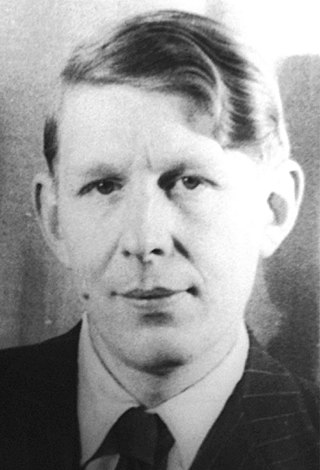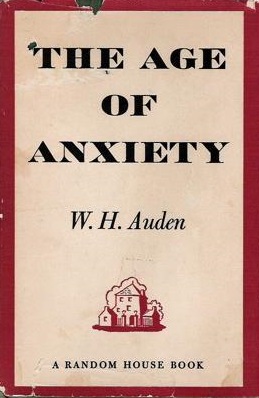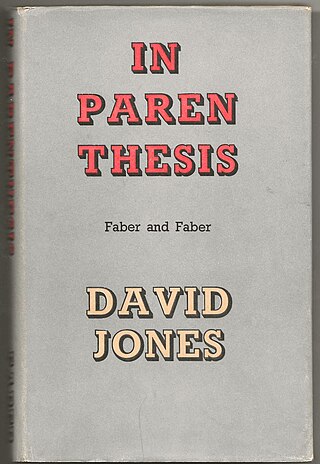
Wystan Hugh Auden was a British-American poet. Auden's poetry is noted for its stylistic and technical achievement, its engagement with politics, morals, love, and religion, and its variety in tone, form, and content. Some of his best known poems are about love, such as "Funeral Blues"; on political and social themes, such as "September 1, 1939" and "The Shield of Achilles"; on cultural and psychological themes, such as The Age of Anxiety; and on religious themes, such as "For the Time Being" and "Horae Canonicae".

Abraham Cowley was an English poet and essayist born in the City of London late in 1618. He was one of the leading English poets of the 17th century, with 14 printings of his Works published between 1668 and 1721.

The Age of Anxiety: A Baroque Eclogue is a long poem in six parts by W. H. Auden, written mostly in a modern version of Anglo-Saxon alliterative verse.
Michael Roberts, originally named William Edward Roberts, was an English poet, writer, scientist, mathematician, critic and broadcaster, a polymath who made his living as a teacher.

Frederick Louis MacNeice was an Irish poet, playwright and producer for the BBC. His poetry, which frequently explores themes of introspection, empiricism, and belonging, is considered to be among the greatest of twentieth century literature. Despite being renowned as a member of the Auden Group, he was also an independently successful poet with an influential body of work, which is replete with themes ranging from faith to mortality. His body of work was appreciated by the public during his lifetime, due in part to his relaxed but socially and emotionally aware style. Never as overtly or simplistically political as some of his contemporaries, he expressed a humane opposition to totalitarianism as well as an acute awareness of his roots.
Francis Harold Scarfe (1911–1986) was an English poet, critic and novelist, who became an academic, translator and Director of the British Institute in Paris.

"Pangur Bán" is an Old Irish poem written in about the 9th century at or near Reichenau Abbey, in what is now Germany, by an Irish monk about his cat. Pangur Bán, 'White Pangur', is the cat's name, Pangur possibly meaning 'a fuller'. Although the poem is anonymous, it bears similarities to the poetry of Sedulius Scottus, prompting speculation that he is the author. In eight verses of four lines each, the author compares the cat's happy hunting with his own scholarly pursuits.

Poems is the title of three separate collections of the early poetry of W. H. Auden. Auden refused to title his early work because he wanted the reader to confront the poetry itself. Consequently, his first book was called simply Poems when it was printed by his friend and fellow poet Stephen Spender in 1928; he used the same title for the very different book published by Faber and Faber in 1930, and by Random House in 1934, which also included The Orators and The Dance of Death.
— W. H. Auden, from "September 1, 1939"
Nationality words link to articles with information on the nation's poetry or literature.

Letters from Iceland is a travel book in prose and verse by W. H. Auden and Louis MacNeice, published in 1937. Auden revised his sections of the book for a new edition published in 1967.

Journey to a War is a travel book in prose and verse by W. H. Auden and Christopher Isherwood, published in 1939.

The Double Man is a book of poems by W. H. Auden, published in 1941. The title of the UK edition, published later the same year was New Year Letter.
"The Sea and the Mirror: A Commentary on Shakespeare's The Tempest" is a long poem by W. H. Auden, written 1942–44, and first published in 1944. Auden regarded the work as "my Ars Poetica, in the same way I believe The Tempest to have been Shakespeare's."
This is a list of all works by Irish poet and dramatist W. B. Yeats (1865–1939), winner of the 1923 Nobel Prize in Literature and a major figure in 20th-century literature. Works sometimes appear twice if parts of new editions or significantly revised. Posthumous editions are also included if they are the first publication of a new or significantly revised work. Years are linked to corresponding "year in poetry" articles for works of poetry, and "year in literature" articles for other works.

In Parenthesis is a work of literature by David Jones first published in England in 1937. Although Jones had been known solely as an engraver and painter prior to its publication, the book won the Hawthornden Prize and the admiration of writers such as W. B. Yeats and T. S. Eliot. Based on Jones's own experience as an infantryman in the First World War, In Parenthesis narrates the experiences of English private John Ball in a mixed English-Welsh regiment, starting with embarkation from England and ending seven months later with the assault on Mametz Wood during the Battle of the Somme. The work employs a mixture of lyrical verse and prose, is highly allusive, and ranges in tone from formal to Cockney colloquial and military slang.
This is a bibliography of books, plays, films, and libretti written, edited, or translated by the Anglo-American poet W. H. Auden (1907–1973). See the main entry for a list of biographical and critical studies and external links. Dates are dates of publication of performance, not of composition.
"Epilogue for W. H. Auden" is a 76-line poem by Louis MacNeice. It was written in late 1936 and was first published in book form in Letters from Iceland, a travel book in prose and verse by W. H. Auden and Louis MacNeice (1937). MacNeice subsequently included it as the last poem in his poetry collection The Earth Compels (1938). "Epilogue for W. H. Auden" reviews the Iceland trip MacNeice and Auden had taken together in the summer of 1936; the poem mentions events that had occurred while MacNeice and Auden were in Iceland, such as the fall of Seville and the Olympic Games in Berlin.
A Choice of Kipling's Verse, made by T. S. Eliot, with an essay on Rudyard Kipling is a book first published in December 1941. It is in two parts. The first part is an essay by American-born British poet T. S. Eliot (1888–1965), in which he discusses the nature and stature of British poet Rudyard Kipling (1865–1936). The second part consists of Eliot's selection from Kipling's poems.









